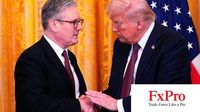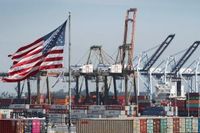On May 8, 2025, the United States and the United Kingdom reached a "complete and comprehensive" trade agreement, marking a significant milestone in international trade relations. This agreement is the first of its kind since President Donald Trump launched a global tariff campaign on April 2, which he dubbed "Liberation Day." Trump announced the deal on his social media platform, Truth Social, stating that it would strengthen the relationship between the two nations for many years to come.
Trump expressed his enthusiasm for the agreement, describing it as a "very important and interesting day" for both countries. He also hinted that multiple other agreements are currently under serious negotiation, suggesting a potential shift in the global trade landscape. The announcement was eagerly awaited, as it follows British Prime Minister Keir Starmer's visit to the White House in February, where he sought to solidify trade ties with the US amid rising tariff tensions.
The trade deal aims to mitigate the adverse effects of tariffs on key sectors such as automotive, food and beverage, and steel industries in the UK. The total annual trade volume between the UK and the US is approximately £314.6 billion ($417.6 billion), with £196 billion ($260 billion) attributed to British exports to the US. Starmer hailed the agreement as a victory for the UK, particularly following a recent free trade agreement with India, which was the largest since Brexit.
US Secretary of State Marco Rubio commented on the significance of the agreement, stating that it represents an important step towards establishing fair and reciprocal trade relationships with partners worldwide. The US has faced increasing pressure from investors to stabilize the trade environment, especially after the implementation of a 10% base tariff on most countries and higher tariffs on specific nations, including a 25% tariff on automobiles, steel, and aluminum.
Meanwhile, the global markets reacted positively to the trade announcement. Gold prices plummeted significantly, reflecting a shift in investor sentiment towards riskier assets. Spot gold fell 1.7% to $3,307.84 per ounce, while US gold futures dipped 2.5% to $3,306. The decline in gold prices is attributed to heightened expectations of similar trade agreements between the US and other nations, which undermines gold's status as a safe haven during geopolitical uncertainties.
Bob Haberkorn, a senior market strategist at RJO Futures, noted that if the US successfully negotiates an agreement with China, gold could face considerable pressure, potentially dropping to at least $3,200 per ounce. The market is closely monitoring upcoming meetings between US Treasury Secretary Scott Bessent, US Trade Representative Jamieson Greer, and Chinese economic officials scheduled for May 10 in Switzerland.
In addition to gold, global stock markets and cryptocurrencies surged following the announcement. The Dow Jones Industrial Average increased by 254.48 points, or 0.62%, closing at 41,368.45 points. The S&P 500 also saw gains, rising 32.66 points, or 0.58%, to finish at 5,663.94 points. Notably, airline stocks experienced a significant boost after the US exempted taxes on aircraft parts produced by Rolls-Royce, leading to a 5.4% increase in the S&P 500 passenger airline industry index.
President Trump expressed optimism regarding the potential for a successful trade agreement with China, stating that the upcoming negotiations in Geneva could yield meaningful results. Scott Welch, an investment director at Certuity, remarked on the positive market reaction to the UK agreement, emphasizing the importance of Trump's statements regarding the significance of the talks.
As the global landscape continues to evolve, the implications of the US-UK trade agreement are expected to resonate across various sectors, influencing not only trade policies but also market dynamics in the coming months. The agreement is seen as a crucial step in reshaping US trade relationships, particularly in light of the ongoing tariff disputes and the need for economic stabilization.
In related news, the People's Bank of China has approved commercial banks to purchase foreign currency for gold imports under a newly expanded quota, which is anticipated to boost demand in the medium term. However, analysts remain cautious, noting that the impact of this move is currently overshadowed by tariff-related developments.
Overall, the trade agreement between the US and the UK marks a pivotal moment in international trade relations, with far-reaching consequences for both nations and the global economy.







